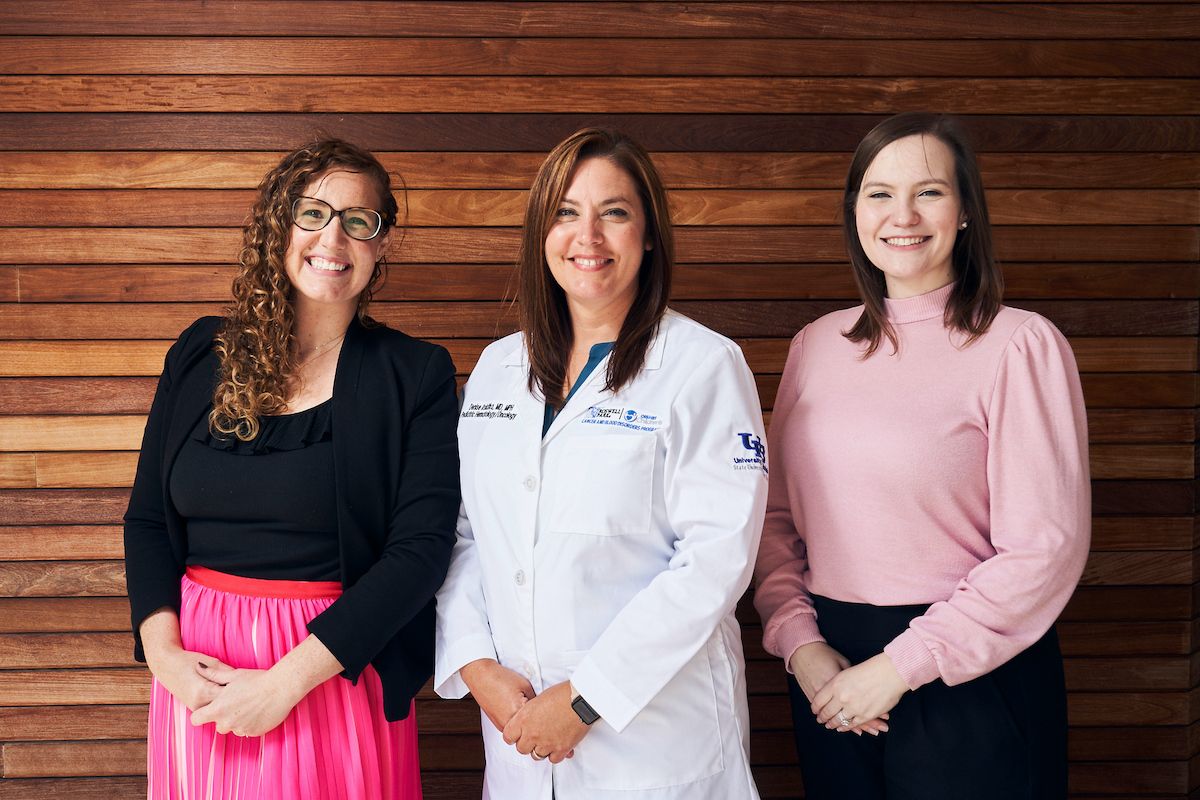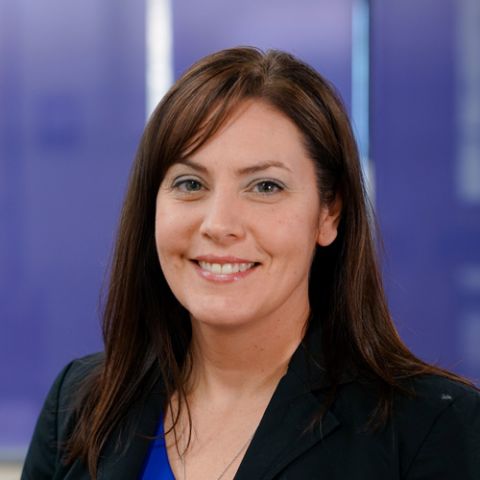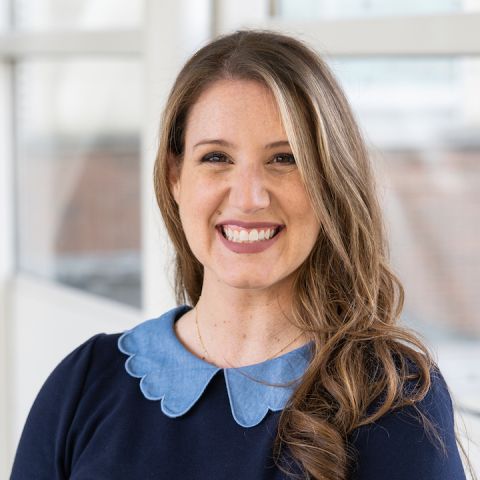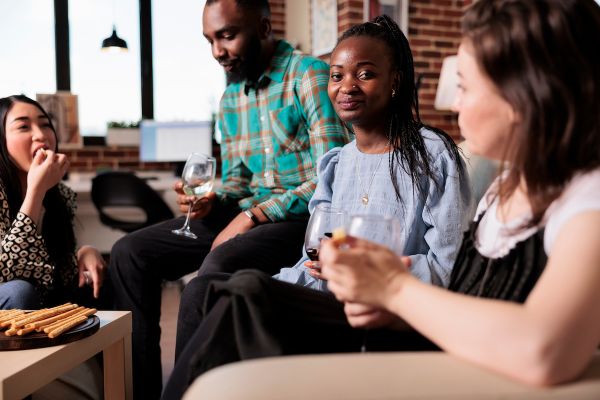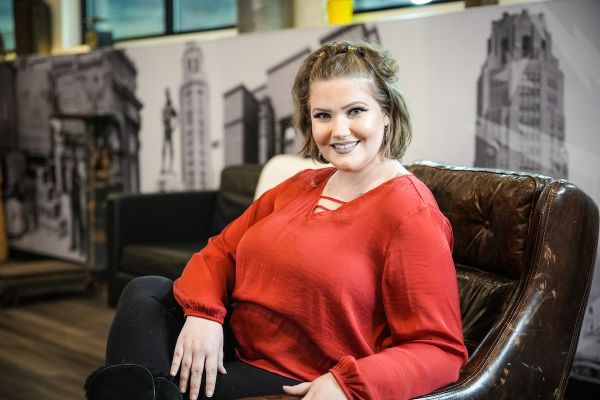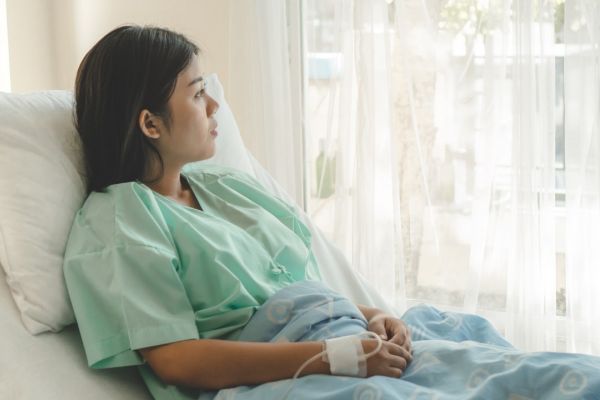Imagine being 18 years old, ready to embark on your independent life for the first time, excited to start college or go into your career. The whole world is open and filled with possibility. Or being in your late 20s or early 30s, establishing your career and your family, thinking about buying a house, and everything feels like it’s going your way.
But then comes a cancer diagnosis. Suddenly everything sure, certain and exciting is flipped upside down.
For young adults who are being treated at Roswell Park Comprehensive Cancer Center, the Young Adult team is standing by, ready to provide support and guidance through a tumultuous time.
“This is an extra support team that we have for patients between the age of 18 and 39 who are dealing with cancer. We’re an extra hand to hold while people are going through the chaos of a cancer diagnosis and then helping them navigate life into survivorship,” says Ashley King, Wellness Program Coordinator for the Young Adult Program. “This can be helping patients understand their options when it comes to fertility preservation to nutrition or physical therapy. It can also be the mental and emotional support side, with our dedicated young adult psychologist, who can help with counseling for our patients and their caregiver.”
King’s job also involves coordinating more pleasant and fun activities, building community and providing a break from the stress of living with cancer. She schedules and helps arrange things like ice skating, movie nights, sporting events, yoga workshops and other events to help patients in this age range take a break from thinking and talking, constantly, about their illness.
The team keeps a busy calendar and tries to incorporate activities for many interests, including outings that are family friendly and can involve young children. “There are so many young adults here under the roof at Roswell Park and everybody wants something different. Everyone is at a different point in their life, so we want to have something for everybody,” King says.
There are currently more than 450 people who receive King’s monthly newsletters and regular emails with updates, programs, outing information and other resources, including a dedicated phone number people can call or text at any time to reach her.
At the center of the Young Adult Program is the dedication to help support people through a difficult time, even if the team doesn’t have answers to all the big, pressing questions the patients might be facing. “Your 20s and 30s are a really challenging time of your life, even without cancer. There’s so much to navigate – you’re figuring out who you are, what your life is going to look like, what your goals and ambitions are,” King says. “For anybody at any point in their life to get a cancer diagnosis, everything stops. No matter your age, cancer halts your plans and changes everything. But especially for young adults, we find a cancer diagnosis can really cause even more unique and bigger challenges.”
Cancer treatment impacts young adults in unique ways
Young adult patients have myriad questions that differ significantly from pediatric or adult patients, from whether their treatment might interfere with dreams of having children one day to how to manage delicate conversations pertaining to dating or how to tell their friends and family about their illness. There’s also the stress of trying to continue their lives amid doctor appointments, wanting to maintain a normal routine including socializing with friends to whom a patient might look, on the outside, like everything’s just fine.
Many of these patients are diagnosed at later stages because many symptoms of common cancers for this age range can be misidentified or overlooked, explains Denise Rokitka, MD, MPH, Director of Pediatric and Adolescent Cancer Survivorship, the Young Adult Program and the Oncofertility Program at Roswell Park. Unfortunately, that puts some patients at higher risk of complications and bad outcomes for long-term survivorship. “With young adult patients, their outcomes might not be as good as with children or adults because it sometimes takes longer to diagnose their cancer. A lot of patients come to us after going through multiple primary care visits, or more often, urgent care visits.
“This population also tends to put off a lot of things because they’re busy and they need to work, or they need to go to school or they need to care for their families,” Dr. Rokitka says. “We try to explain what it means to be a young adult patient, the services we offer in terms of psychotherapy, acupuncture, and/or nutrition. Many young adult patients are interested in a more holistic approach to care and we can help to guide patients with this type of intervention as well.”
Fertility preservation is a key component of discussion for this team. Unfortunately, only about 25% of eligible patients, some of whom are in the pediatrics program (depending on their age at the time of diagnosis), speak with Dr. Rokitka about whether they want to pursue avenues that would help them increase their odds of having children after they complete treatment. Many more patients are eligible for the services. It’s important to learn your options even if you’re unsure about having children. “Some patients ask whether they should even consider fertility preserving efforts, if their cancer is possibly hereditary,” she says.
Mental, emotional support is essential
Dr. Rokitka often will follow up with patients after treatment, “just to make sure they’re doing physically and emotionally OK.” She also reminds patients that there is a specialized psychologist available for them as well.
“I can’t fix what they’re going through, but I can walk with them and allow them the space to express what this experience is like for them without having to censor it because they’re worried about how it will burden their loved ones,” says medical psychologist Erin Brewer-Spritzer, PsyD, who is dedicated to the Young Adult Program. “The impact a diagnosis of cancer has on our young adults is multifaceted, especially when it comes to identifying emotionally safe loved ones to hold some of the harder moments and thoughts that accompany this experience. This resulting self-censorship has the potential to amplify feelings of isolation and loneliness, not only from peers, but from immediate loved ones as well.”
Why Roswell Park for young adults?
You need a team that understands the nuances of treating cancer in young adults and a complexity and level of care and experience that can only be found at a comprehensive cancer center, such as Roswell Park.
Often patients will want to appear “okay” among family and friends to prevent them from worrying about their cancer. “My role is to say ‘I’m not part of your inner team. I’m not the person you have to censor the pain, the hard, the scary feelings from if you feel like that’s something you’re carrying. I’m not here to force you to touch that. But I can hold it with you.’”
Supporting the whole patient, whatever they need – medically, emotionally, socially, psychologically – as they navigate being a young adult with cancer is the utmost priority for the Young Adult team, who work closely together to coordinate efforts, and help patients understand that other services are available.
“We will be there for anybody at any point that they want us, whether that is right at diagnosis or further into survivorship,” King says. “We hope to be able to connect with even more young adults to help them be as strong as possible through their cancer treatment. We’re there every step of the way, whenever they may need. We provide support through all the unique challenges, and we’re also there to celebrate with them, as they come out even stronger.”
